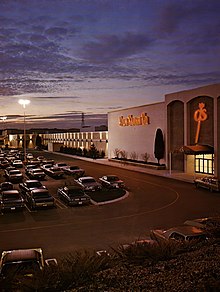Cain-Sloan
This article needs additional citations for verification. (August 2007) |
| Industry | Retail |
|---|---|
| Founded | 1903 |
| Founder | Paul Lowe Sloan Pat Cain John E. Cain |
| Headquarters | Nashville, Tennessee, U.S. |
Area served | United States |
Key people | John Sloan |
Cain-Sloan Co. Inc. was a department store chain based in Nashville, Tennessee, United States. It was founded in 1903, merged with Allied Stores in 1955, and with Dillard's in 1987. It was a target of the 1960 Nashville sit-ins.
History
[edit]
The store was co-founded by Paul Lowe Sloan, Pat Cain and John E. Cain in Nashville in 1903.[1] The company merged with Allied Stores Corp. of New York in 1955 and remained under its umbrella before being sold to, and renamed, Dillard's in 1987–1988.[1]
The chain had four locations: Downtown Nashville, Hickory Hollow Mall, Rivergate Mall, and The Mall at Green Hills.
Civil Rights Movement
[edit]Cain-Sloan was a target of one of the earliest sit-in protests by young African-Americans in Nashville during the Civil Rights Movement.[2] On December 5, 1959, future Congressman John Lewis led a group of college students who entered the store intending to sit at its lunch counter. They were politely asked to leave, and they did so.[3] After the march on Nashville's courthouse in April 1960 and the admission by Mayor Ben West that lunch counters "ought to be desegregated",[4] Cain-Sloan and other downtown Nashville stores quietly opened their counters to all races as of May 10, 1960.[5]
Conversion to Dillard's
[edit]In 1987, shortly before Allied Stores merged with Campeau Corporation,[6] the four Cain-Sloan stores were sold to Dillard's in a separate deal. Dillard's entered Nashville as it took over operations of the three mall stores, but closed the downtown store instead of converting it. In 1991, Dillard's replaced the former Cain-Sloan with a new building at Hickory Hollow Mall as part of a mall expansion.
Since then, Dillard's has expanded in the Nashville market by building two new stores (Bellevue Center and Cool Springs Galleria) and acquiring three former Castner Knott stores (Donelson Plaza, Harding Mall, and Murfreesboro's Stones River Mall). Dillard's has since rebuilt the Stones River location and closed the Harding Mall, Donelson Plaza, Bellevue Center and Hickory Hollow Mall locations. Hickory Hollow was the first of the converted Cain-Sloan locations to close, though it left its original building in 1991.[citation needed]
References
[edit]- ^ a b Smith, David (October 12, 2016). "Cain-Sloan reunion highlights the golden era of department store families". The News. Retrieved July 27, 2018.
- ^ Bliss, Jessica (May 9, 2020). "60 years ago, Nashville became the first city in the segregated South to integrate lunch counters". The Tennessean. Gannett. Retrieved November 1, 2021.
- ^ John Lewis, Walking with the Wind, pp. 88-89; ISBN 0-15-600708-8
- ^ "NewsChannel 5.com - Nashville, Tennessee - Nashville Sit-ins". Archived from the original on 2007-09-27. Retrieved 2007-08-08.
- ^ "Nashville Integrates Six Lunch Counters; NASHVILLE STORES HALT RACIAL BANS". The New York Times. May 11, 1960. Retrieved November 10, 2021.
- ^ Knight Stivender, "Elizabeth Sloan Bainum, 87, dies; Services Tuesday." The Tennessean, October 31, 1999.)
